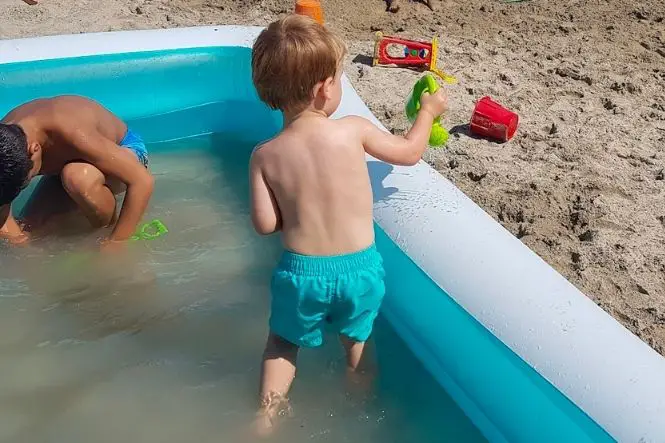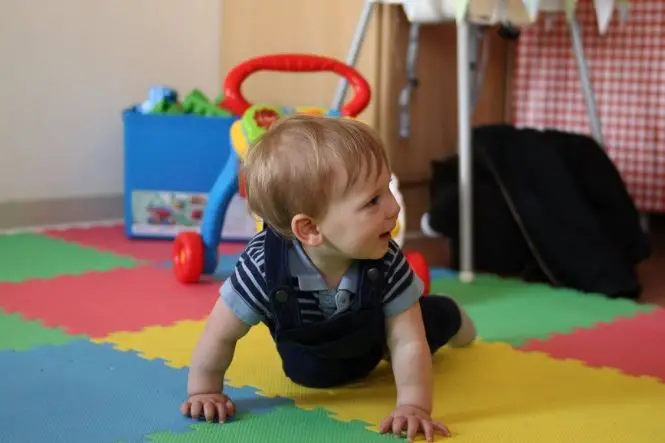Everybody wants the best for their kids and oftentimes, when they’re sick, it doesn’t knock them down like it does an adult. So you end up thinking to yourself, “what’s the harm in letting them go for a swim?”
Of course, much depends on what kind of sickness your child has, how bad it is, and what the dangers of physical activity and being immersed in water are. You certainly don’t want them to come out of the water sicker than they were before. There’s also a concern for other swimmers as you don’t want your child to spread sickness around no matter how active they seem or how little their sickness seems to be affecting them.
Table of Contents
Children Swimming With The Common Cold or Flu
There are some factors you should consider if your child only has a common cold and they are on the downhill side of it.
- What kind of water they’ll be swimming in
- Will there be other kids or people around
- How your child often reacts to physical activity when sick
- Whether or not they have a fever
- Sinuses
- Energy levels
What kind of water your child will be swimming in is an important factor to consider. Swimming pools that are full of chlorinated water can often make colds worse because the chlorine is harsh on the nasal cavities.
Chlorinated water is also harsh on the throat if your child happens to get some of the water in their mouths. It’s possible that it can exacerbate a sore throat or make a cough much worse than it already is.
After the period of fever has passed, you’re child is still contagious. Even the common cold can be infectious for up to three weeks. So if there are people around—or other kids—it’s probably best to keep your child at home so you don’t spread the love to the entire community.
You know your child better than anyone else. How physically active are they when they are coming down with a cold, during a cold, and right after a cold? You obviously don’t want them to engage in physical activity like swimming if they don’t handle it well.
Feverish children should never go swimming. For one, it’s the most contagious period when you have a cold. For two, it’s a period in time where myocarditis is potentially an issue. Lastly, the abrupt temperature changes aren’t going to be pleasant and can potentially make the cold worse.
Swimming With The Flu
Many people automatically equate the common cold with the flu. The two aren’t even remotely the same and the flu is far worse than the common cold. You shouldn’t allow your child to swim when they have the flu for a variety of reasons.
- Spreading the flu is far more dangerous than spreading the common cold
- The flu is far more physically exhausting than a cold
- Kids with the flu are far more vulnerable than they are with the cold
When it comes to the flu, it’s like all of the worst aspects of the common cold turned up to maximum volume. It’s best to wait a while until the worst of it has passed.
You also don’t want them to spread the flu. The flu is deadly to the most vulnerable in our society including the elderly and those with underlying conditions. Unlike the common cold, the flu is far more deadly to them.
Chicken Pox
Now that there are chickenpox vaccines are widely available and administered in schools, this has become far less of a problem than it once was. If your child does get chickenpox, however, they should not go swimming.
Chickenpox is incredibly infectious and any contact with another child is liable to spread it around in a hurry. Also, since it is a condition of the skin, it could react poorly to chlorinated water, in some cases become itchier.
Only once the blisters from chickenpox have completely cleared up should you allow your child to go swimming again and be around other kids for any period of time.
Diarrhea, Vomiting, Nausea, or Dizziness
These should be obvious warnings. You should never allow your child to go swimming if they have any of the above conditions. You certainly don’t want any accidents to be spread around in the pool, regardless of how heavily chlorinated it is.
That includes dizziness and nausea because you never know when either one could suddenly induce vomiting or possibly diarrhea. In addition to that, diarrhea, nausea, vomiting, or dizziness could be underlying symptoms of something worse.
Knowing that, it’s better to let them have full, unmitigated access to the bathroom, plenty of water, and plenty of rest.
Eczema
It’s usually okay to let your child go swimming with eczema, even if they’re having a flare-up. There is some possibility that chlorinated water will exacerbate the situation but it’s unlikely.
If your child has eczema, just be sure that they have plenty of the lotion they need or that their pediatrician recommends before they go swimming. They’ll also want to put their lotion on after getting out and drying up.
Chlorine has a tendency to dry us out some, which could aggravate or incite an eczema flare-up. They also make specialized swimsuits for kids who have eczema that is supposed to be more gentle on their skin while swimming.
These swimsuits protect your child’s already sensitive skin from any additional chafing, abrasions, or sunlight exposure. Eczema swimsuits are generally UV resistant on top of their other protective features. It’s something worth considering, especially if flare-ups are frequent and severe.
All Things Considered
The only two conditions where it would be considered safe or suitable for your child to go swimming while sick, are light, common colds, and eczema. There are exceptions here and there, depending on where they’re swimming, the water, and other people.
It’s never safe for you to let your child swim with a fever or while they’re severely contagious, especially with the flu or something comparable. As much as it may hurt your child’s feelings, sometimes it’s best to just wait it out.







